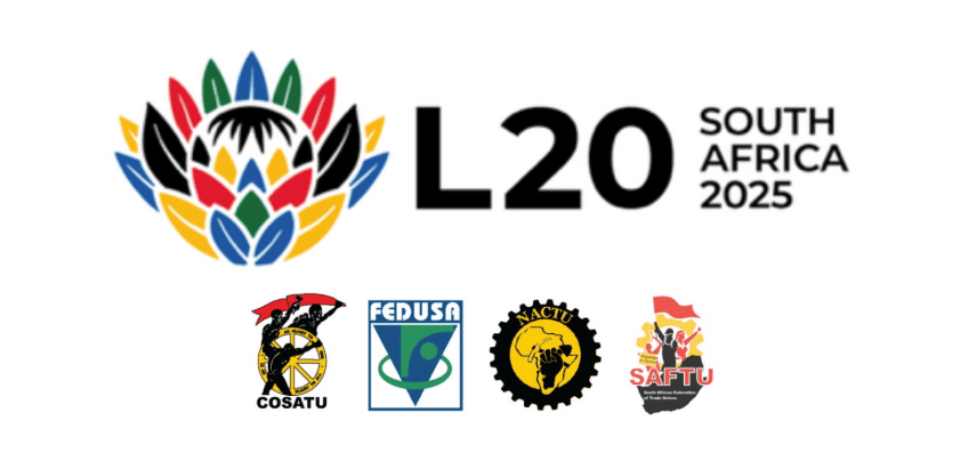30 July 2025
The South African labour movement, represented by its four major federations COSATU, FEDUSA, SAFTU and NACTU, concludes the 2025 Labour 20 (L20) Summit with a collective and resolute voice. Across two days of intensive engagement in George in the Western Cape on the sidelines of the G20 Employment Working Group meeting and Labour and Employment Ministers’ Meeting, we were joined by our comrades from around the world to put forward a workers’ agenda that centres dignity, decent work and democratic economic transformation.
This Summit took place in a moment of global turmoil. Workers are facing spiralling inequality, stubborn unemployment, rising authoritarianism, deepening climate devastation and collapsing public services. In the Global South, these crises are compounded by debt, weak state capacity and the brutal legacies of colonial exploitation. Our call is simple and unwavering: the working class will not pay for the failure of a system rigged against them. We will not allow our future to be sacrificed at the altar of profit and geopolitical power.
From the opening of the L20 through to its closing, South Africa’s trade union movement carried the mandate of millions. We placed at the heart of the programme the need to reclaim and rebuild multilateralism, demand a new social contract and reverse the decline in labour’s share of income. Workers are not commodities nor statistics. We are the architects of society and any global recovery that excludes them is a blueprint for deeper inequality.
On Decent Work and the Crisis of Informality
With over 60 percent of workers worldwide trapped in informal and precarious employment, we called for a comprehensive agenda for formalisation. This includes labour law reform, expanded labour inspections, ratification and implementation of all ILO instruments, and inclusive social protection. Trade unions must be at the centre of this shift. We affirm that informal workers are workers. Their rights are not negotiable. We demand that governments and employers end the decades of delay and move decisively toward institutionalising decent work.
On the Climate Crisis and the Just Transition
The Summit was unequivocal that climate justice without worker justice is a contradiction. The transition to low-carbon economies must not be driven by private interests or neo colonial extractive models. It must be public, inclusive, and anchored in rights. Africa cannot continue to power green growth elsewhere while its people remain in poverty and unemployment. Climate finance must reach communities and must not be swallowed by debt repayments or corporate greed. Rich countries must pay their historical debt and finance the just transition in the Global South. Public investment, social dialogue, adjustment costs, and job guarantees must become the pillars of green industrial policy.
On Trade Justice and the AfCFTA
Trade rules today serve profit, not people. The Trump-era trade wars have exposed the brutal consequences of weaponised tariffs. The answer is not a return to unregulated globalisation, but the building of a just trade system grounded in solidarity and equity. The African Continental Free Trade Area (AfCFTA) must not replicate extractive models or enable elite accumulation. It must be underpinned by binding labour and social clauses, enforceable labour rights, regional and continental industrial policy as well as a continental minimum wage vision. We demand an end to illicit financial flows, fraudulent imports and labour exploitation. Trade unions must have a permanent seat at the table in AfCFTA negotiations, designing and monitoring trade protocols with real oversight. We also call for the prioritisation of youth’s access to decent work, more so in light of the fact that Africa has the youngest population in the world.
On Progressive Taxation and Fiscal Justice
The debt crisis is robbing countries of their future. While billionaires dodge taxes and corporations hoard profits, the poor are forced to endure austerity, wage suppression and broken public services. This Summit demanded a global wealth tax and supported the resolution made in Brazil, proposing a two percent levy on the fortunes above one billion dollars. We call for automatic debt cancellation for education, health, and climate. We reject conditionalities that dismantle state institutions and reduce democracy to market discipline. Our fiscal systems must shift from serving capital to serving communities because no transition will succeed without the expansion of fiscal space and the redistribution of wealth.
On Gender Equality and Youth Empowerment
The Summit reaffirmed its commitment to reducing the gender labour participation gap and supporting the Brisbane and eThekwini Roadmaps. The feminisation of poverty must end. Women must not continue to carry the burden of unpaid care work. We demand investment in the care economy, protections for vulnerable women workers, and gender-based violence legislation that is fully implemented and enforced. We also call for the realisation of the Nelson Mandela Bay Youth Target to reduce NEET rates. Young people must have access to green jobs, entrepreneurship support and digital infrastructure. A just economy is impossible without gender justice and youth inclusion.
On Digitalisation, Artificial Intelligence and Platform Workers
As AI and digital platforms reshape work, we warned against a future of hyper- surveillance, algorithmic wage theft and exclusion. Platform workers are being misclassified, denied basic protections, and subjected to inhumane working conditions by companies that exploit regulatory gaps. We believe that this is not innovation but is exploitation wrapped in code.
We therefore advance the following resolution:
We demand full recognition of platform workers as workers under labour law, with the right to unionise, access social protection, earn a living wage and be protected against unfair termination. Their classification as “independent contractors” is a legal fiction that enables exploitation and strips them of core rights.
We further demand algorithmic transparency, where workers have access to the data that governs their performance and livelihoods. No worker should be at the mercy of a faceless system they cannot question. Governments must introduce mandatory due diligence and public oversight over all digital labour platforms operating within their borders.
Finally, we reject digital colonialism. The infrastructure of the digital economy must be public, universal, and democratic. We call for international standards to ensure cross- border accountability, worker data sovereignty, and fair taxation of platform giants. Technology must serve labour, not subjugate it.
On Global Peace, Palestine and the Defence of Multilateralism
The Summit did not shy away from naming the assault on Palestine by Israel, a genocide. The labour movement in South Africa, joined by progressive forces globally, condemned in the strongest possible terms the ongoing war against Palestinians and the systematic destruction of Gaza. What we are witnessing is not a conflict. It is the deliberate erasure of a people, a territory, and a future. It is genocide. We call on the international community to act decisively to end the siege, hold perpetrators accountable, and deliver justice to the Palestinian people. Multilateral institutions must not continue to look away. They must reclaim their mandate to defend international law, human rights and peace.
Furthermore, the labour movement unequivocally condemns NATO’s decision to increase military spending to 5 percent of national incomes by 2035, a diversion of resources away from public health, education and social protection. Security cannot be measured solely through weapons stockpiles. True security is the guarantee of decent work, functioning public services, and lives free from fear and displacement.
Conclusion: A Call to Action
This L20 was not an end. It was a beginning. We are clear. The working class must rise to meet the moment. We must rebuild power at the shop floor, at national bargaining councils, in global supply chains, and in every policy space. We are building a movement that is grounded in democratic unionism, internationalism and collective action.
To every government represented at the G20, we say this: your time for polite promises is over. The world of work is watching. The workers of the world are organising. And we are no longer willing to wait.
The future must belong to the many, not the few.
Issued by COSATU, FEDUSA, SAFTU and NACTU For Media Enquries
Betty Moleya
FEDUSA Media and Communications
063 736 5533
communications@fedusa.org.za
END.

